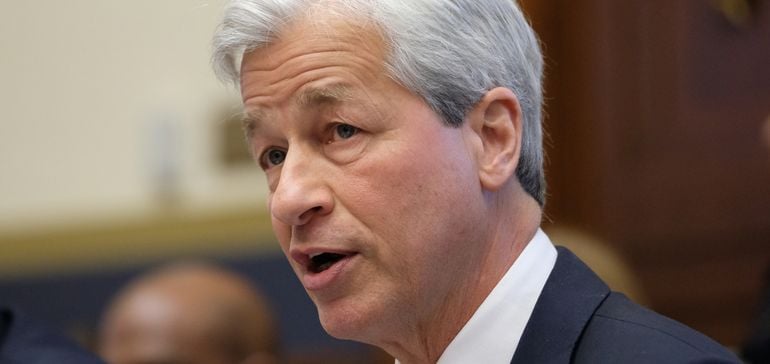JPMorgan Chase on Thursday shut down the website for Frank, the college financial planning platform it bought for $175 million in September 2021.
“Frank is no longer available,” the website reads. “To file your Free Application for Federal Student Aid (FAFSA), visit StudentAid.gov.”
JPMorgan sued Frank’s founder, Charlie Javice, and a second executive last month in federal court in Delaware, accusing Javice of vastly exaggerating the platform’s customer base, then creating fake student accounts to back up her claims.
In pitch materials and verbal presentations, Javice claimed Frank had 4.25 million users, but the platform’s actual customer base numbered fewer than 300,000, the bank said in its suit, filed Dec. 22 in federal court in Delaware.
“To cash in, Javice decided to lie, including lying about Frank’s success, Frank’s size, and the depth of Frank’s market penetration in order to induce JPMC to purchase Frank,” the bank said in its suit, according to CNBC.
When JPMorgan asked Javice to share Frank’s customer list, she first said she couldn’t because of privacy concerns, the bank said in its suit.
“After [JPMorgan] insisted, Javice chose to invent several million Frank customer accounts out of whole cloth,” JPMorgan said, according to The Wall Street Journal.
JPMorgan realized there were errors with the user list when it sent marketing emails to a batch of 400,000 Frank customers, and about 70% of the emails bounced back, the bank said in its suit.
Javice’s suit
Javice, for her part, sued JPMorgan in Delaware Chancery Court, alleging the bank launched an internal investigation of the Frank deal last spring, then fired her in November from her role as head of student solutions to get out of paying her a $20 million retention bonus, Bloomberg reported.
In her suit, Javice called the investigations “groundless” and said the bank “manufactured a for-cause termination in bad faith,” according to The Wall Street Journal.
“After JPM rushed to acquire Charlie’s rocketship business, JPM realized they couldn’t work around existing student privacy laws, committed misconduct and then tried to retrade the deal,” attorney Alex Spiro, who is representing Javice, told the publication. “Charlie blew the whistle and then sued.”
Javice “was not and is not a whistleblower,” Pablo Rodriguez, a JPMorgan spokesperson, told CNBC in a statement. “Any dispute will be resolved through the legal process.”
Olivier Amar, the second executive named in JPMorgan’s suit, could not be reached by The Wall Street Journal. An attorney for Amar could not be identified by Bloomberg.
The customer list
After JPMorgan asked for a Frank customer list, Javice asked her engineering chief to create “fake customer details,” including names, birthdays and schools they attended, using algorithms, the bank alleges in its suit.
When the engineer refused, Javice and Amar hired a data science professor at a New York-area college — the professor is not named in the suit and was allegedly paid $18,000 — to create the accounts, the bank said.
JPMorgan included in its suit emails between Javice and the professor, which the bank could access because it had acquired Frank’s technology systems, CNBC reported.
“Our plan was to sample first name and last name independently and then ensure none of the sampled names are real,” the professor wrote to Javice, according to the suit.
In one exchange, Javice allegedly asked the professor: “Will the fake emails look real with an eye check or better to use unique ID?”
Embarrassing episode
The Frank dust-up is an embarrassing development for JPMorgan, which, when it acquired the startup, trumpeted its “desire to have lifelong, engaged relationships with all of our customers.”
“Charlie and her team have built an amazing connection to the student population,” Jennifer Roberts, JPMorgan’s head of consumer banking, said in 2021. JPMorgan had exited the private student-lending space in 2013.
It wouldn’t be JPMorgan’s first egg-face episode over its dealings outside of banking. The bank faced brutal backlash in 2021 when it agreed to underwrite up to $4.8 billion toward a breakaway European soccer league that crumbled before even one match was played.
Regulations prohibit JPMorgan from acquiring additional U.S.-based deposit-taking institutions because the bank already holds more than 10% of U.S. deposits. Nonetheless, CEO Jamie Dimon pledged in 2020 to be “much more aggressive with acquisitions across the board.”
JPMorgan, in 2021 and 2022, made a series of banking-adjacent acquisitions, including restaurant platform The Infatuation, British digital wealth-management platform Nutmeg and a 49% stake in the Greek fintech Viva Wallets.
JPMorgan is seeking material damages in the Javice suit “in an amount to be proven at trial, but not less than $175 million,” the bank said, according to CNBC.



